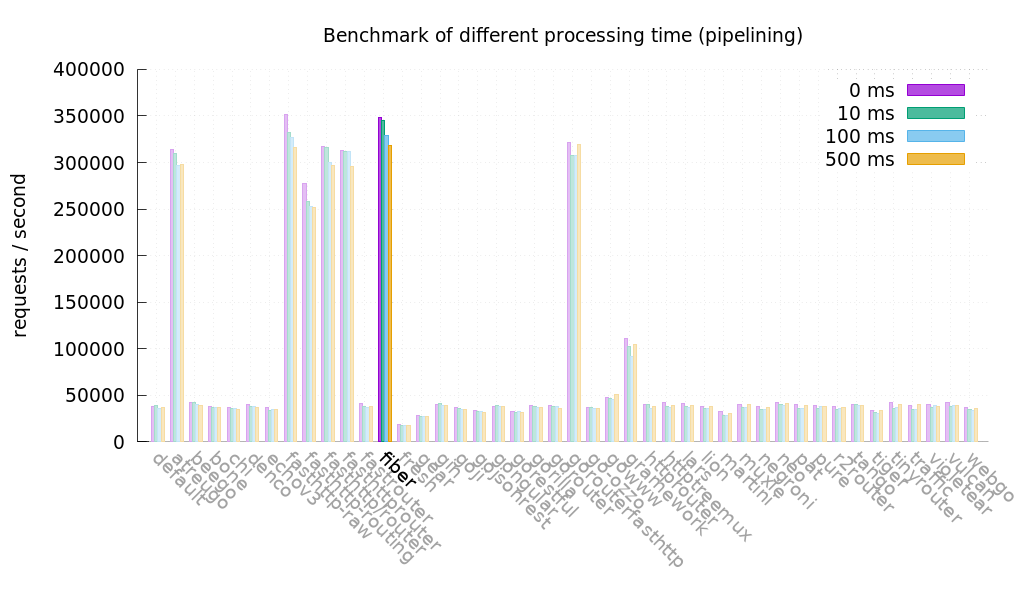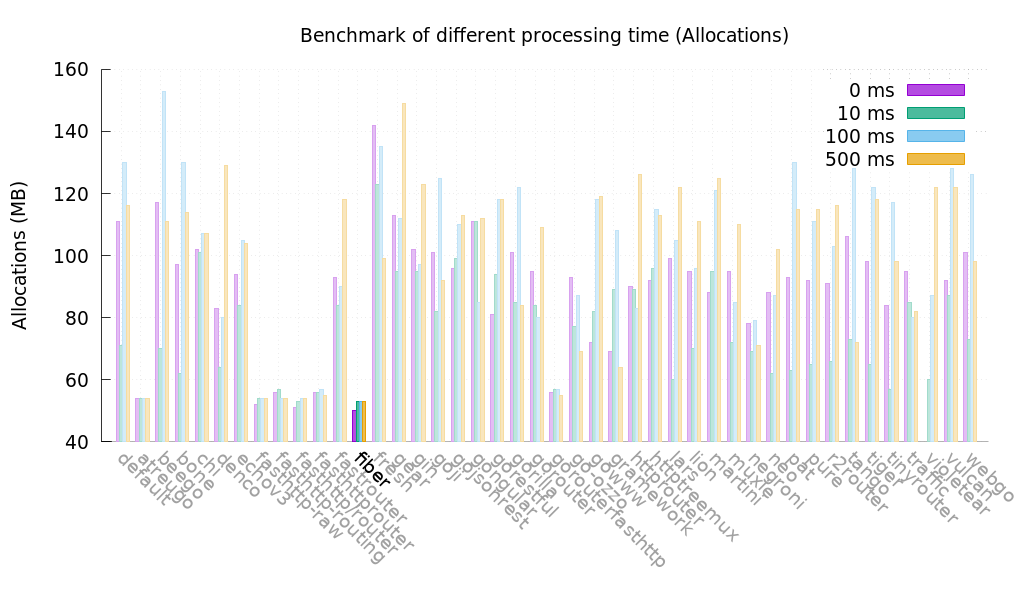Fiber é inspirado no framework Express, o mais popular da web. Combinamos a usabilidade do Express e o desempenho bruto do Go. Se você já construiu uma aplicação web usando Node.js (usando Express ou um framework similar), muitos métodos e princípios devem ser muito fáceis de entender para você.
Início rápido
Instalação
Certifique-se de ter o Go 1.17 ou superior instalado.
Inicialize seu projeto criando uma pasta e executando go mod init github.com/seu/repo dentro da pasta. Em seguida, instale o Fiber usando o comando go get:
go get -u github.com/gofiber/fiber/v2
Olá, Mundo
package main
// Importe o pacote fiber
import "github.com/gofiber/fiber/v2"
func main() {
// Defina o aplicativo fiber
app := fiber.New()
// Defina a rota http
app.Get("/", func(c *fiber.Ctx) error {
// Retorne olá mundo como uma string
return c.SendString("Olá, Mundo ?!")
})
// Ouça na porta 3000
app.Listen(":3000")
}
Acesse via: http://localhost:3000/
Roteamento Básico
Exemplo básico de roteamento do Fiber
func main() {
app := fiber.New()
// GET /api/cadastrar
app.Get("/api/*", func(c *fiber.Ctx) error {
msg := fmt.Sprintf("✋ %s", c.Params("*"))
return c.SendString(msg) // => ✋ cadastrar
})
// GET /voos/LAX-SFO
app.Get("/voos/:de-:para", func(c *fiber.Ctx) error {
msg := fmt.Sprintf("? De: %s, Para: %s", c.Params("de"), c.Params("para"))
return c.SendString(msg) // => ? De: LAX, Para: SFO
})
// GET /dicionario.txt
app.Get("/:arquivo.:extensao", func(c *fiber.Ctx) error {
msg := fmt.Sprintf("? %s.%s", c.Params("arquivo"), c.Params("extensao"))
return c.SendString(msg) // => ? dicionario.txt
})
// GET /john/75
app.Get("/:nome/:idade/:genero?", func(c *fiber.Ctx) error {
msg := fmt.Sprintf("? %s tem %s anos", c.Params("nome"), c.Params("idade"))
return c.SendString(msg) // => ? john tem 75 anos
})
// GET /john
app.Get("/:nome", func(c *fiber.Ctx) error {
msg := fmt.Sprintf("Olá, %s ?!", c.Params("nome"))
return c.SendString(msg) // => Olá john ?!
})
log.Fatal(app.Listen(":3000"))
}
Servindo Arquivos Estáticos
Configurando o serviço de arquivos estáticos
func main() {
app := fiber.New()
app.Static("/", "./public")
// => http://localhost:3000/js/script.js
// => http://localhost:3000/css/style.css
app.Static("/prefix", "./public")
// => http://localhost:3000/prefix/js/script.js
// => http://localhost:3000/prefix/css/style.css
app.Static("*", "./public/index.html")
// => http://localhost:3000/qualquer/caminho/mostra/index/html
log.Fatal(app.Listen(":3000"))
}
Middleware
Aprimore a capacidade de lidar com solicitações HTTP por meio de middlewares.
func main() {
app := fiber.New()
// Corresponder a qualquer rota, aqui personalizar o middleware usando uma função de fecho
app.Use(func(c *fiber.Ctx) error {
fmt.Println("? Primeiro manipulador")
// Continue para lidar com o próximo middleware ou função de rota
return c.Next()
})
// Corresponder a rotas que começam com /api
app.Use("/api", func(c *fiber.Ctx) error {
fmt.Println("? Segundo manipulador")
return c.Next()
})
// Use o middleware integrado para lidar com exceções
app.Use(recover.New())
// GET /api/lista
app.Get("/api/lista", func(c *fiber.Ctx) error {
fmt.Println("? Último manipulador")
return c.SendString("Olá, Mundo ?!")
})
log.Fatal(app.Listen(":3000"))
}
Motor de Template
Se o motor de template não estiver configurado, o Fiber usará por padrão o html/template.
pacote principal
import (
"github.com/gofiber/fiber/v2"
"github.com/gofiber/template/pug"
)
func main() {
// Configurar o motor de template
app := fiber.New(fiber.Config{
Views: pug.New("./views", ".pug"),
})
app.Get("/", func(c *fiber.Ctx) error {
// Renderizar o template ./views/home.pug usando os parâmetros do template fiber.map
return c.Render("home", fiber.Map{
"title": "Página Inicial",
"year": 1999,
})
})
log.Fatal(app.Listen(":3000"))
}
Middleware de Compartilhamento de Recursos de Origem Cruzada (CORS)
Middleware para CORS no Fiber, pode habilitar o compartilhamento de recursos de origem cruzada com várias opções para evitar ataques CORS.
import (
"log"
"github.com/gofiber/fiber/v2"
"github.com/gofiber/fiber/v2/middleware/cors"
)
func main() {
app := fiber.New()
// Configuração CORS padrão
app.Use(cors.New())
// Ou personalizar os parâmetros do CORS para permitir solicitações de determinados domínios
app.Use(cors.New(cors.Config{
AllowOrigins: "https://www.tizi365.com, https://tizi365.com",
AllowHeaders: "Origin, Content-Type, Accept",
}))
log.Fatal(app.Listen(":3000"))
}
Verifique o CORS passando qualquer domínio no cabeçalho Origin:
curl -H "Origin: https://www.tizi365.com" --verbose http://localhost:3000
Resposta 404 Personalizada
func main() {
app := fiber.New()
app.Static("/", "./public")
app.Get("/demo", func(c *fiber.Ctx) error {
return c.SendString("Isto é uma demonstração!")
})
app.Post("/register", func(c *fiber.Ctx) error {
return c.SendString("Bem-vindo!")
})
// O último middleware referenciado corresponderá a todas as solicitações, incluindo 404
app.Use(func(c *fiber.Ctx) error {
// Outra lógica de manipulação
// Retornar status 404
return c.SendStatus(404)
// => 404 "Não encontrado"
})
log.Fatal(app.Listen(":3000"))
}
Resposta JSON
Exemplo de retorno de dados JSON pelo Fiber.
type User struct {
Name string `json:"name"`
Age int `json:"age"`
}
func main() {
app := fiber.New()
app.Get("/user", func(c *fiber.Ctx) error {
return c.JSON(&User{"John", 20})
// => {"name":"John", "age":20}
})
app.Get("/json", func(c *fiber.Ctx) error {
return c.JSON(fiber.Map{
"success": true,
"message": "Olá John!",
})
// => {"success":true, "message":"Olá John!"}
})
log.Fatal(app.Listen(":3000"))
}
Middleware de Recuperação
Interceptar erros de pânico para evitar a interrupção e saída do programa.
import (
"github.com/gofiber/fiber/v2"
"github.com/gofiber/fiber/v2/middleware/recover"
)
func main() {
app := fiber.New()
// Usar o middleware de pânico para interceptar exceções de pânico
app.Use(recover.New())
app.Get("/", func(c *fiber.Ctx) error {
panic("normalmente isso iria travar seu aplicativo")
})
log.Fatal(app.Listen(":3000"))
}
Benchmark
 [
[
Limitações
- Devido ao uso de recursos inseguros no Fiber, pode ser incompatível com as últimas versões do Go. O Fiber 2.40.0 foi testado nas versões do Go de 1.17 a 1.21.
- O Fiber não é compatível com a interface net/http. Isso significa que você não pode usar diretamente projetos como gqlgen, go-swagger, ou qualquer outro projeto pertencente ao ecossistema net/http.